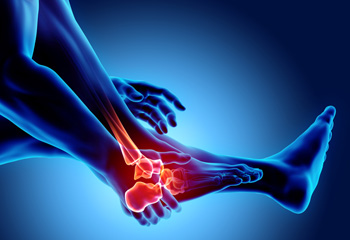
Achilles tendon pain in runners often results from repeated stress on the tendon due to overtraining, poor running form, or wearing unsuitable footwear. Factors such as running on uneven surfaces, failing to warm up, or training with tight calf muscles can place added strain on the Achilles tendon where it attaches to the heel. Pain may begin as a mild discomfort after running, and progress to more constant pain with thickening of the tendon. Without proper medical attention, the tissue can become scarred, reducing flexibility and increasing the risk of further damage. Runners who place uneven pressure on one side of the foot or rely heavily on the forefoot when running are also more likely to develop this condition. A podiatrist can evaluate the structure of the foot and ankle, conduct a gait analysis, and assess tendon involvement through diagnostic imaging. In serious cases, surgery may be required to remove damaged tissue or repair the tendon. If you experience Achilles tendon pain from running, it is suggested that you schedule an appointment with a podiatrist for an exam, diagnosis, and appropriate treatment.
Achilles tendon injuries need immediate attention to avoid future complications. If you have any concerns, contact the foot specialists of Spartan Podiatry. Our doctors can provide the care you need to keep you pain-free and on your feet.
What Is the Achilles Tendon?
The Achilles tendon is a tendon that connects the lower leg muscles and calf to the heel of the foot. It is the strongest tendon in the human body and is essential for making movement possible. Because this tendon is such an integral part of the body, any injuries to it can create immense difficulties and should immediately be presented to a doctor.
What Are the Symptoms of an Achilles Tendon Injury?
There are various types of injuries that can affect the Achilles tendon. The two most common injuries are Achilles tendinitis and ruptures of the tendon.
Achilles Tendinitis Symptoms
- Inflammation
- Dull to severe pain
- Increased blood flow to the tendon
- Thickening of the tendon
Rupture Symptoms
- Extreme pain and swelling in the foot
- Total immobility
Treatment and Prevention
Achilles tendon injuries are diagnosed by a thorough physical evaluation, which can include an MRI. Treatment involves rest, physical therapy, and in some cases, surgery. However, various preventative measures can be taken to avoid these injuries, such as:
- Thorough stretching of the tendon before and after exercise
- Strengthening exercises like calf raises, squats, leg curls, leg extensions, leg raises, lunges, and leg presses
If you have any questions please feel free to contact our offices located in Battle Creek, and Marshall, MI . We offer the newest diagnostic tools and technology to treat your foot and ankle needs.

Sesamoiditis causes pain beneath the big toe due to irritation or injury of the sesamoid bones, which are two small, round bones located under the head of the first metatarsal. These tiny bones are embedded in a tendon and assist with weight-bearing and toe movement. When exposed to repetitive stress, direct trauma, or altered foot mechanics, they can become painful, especially during walking or when wearing thin-soled or high-heeled shoes. Sesamoiditis more commonly affects dancers, joggers, and people with high arches or bunions. Symptoms include toe pain that gets worse with pressure, and swelling, warmth, or redness may occur near the joint. A podiatrist can perform an exam to pinpoint areas of tenderness and assess the structure of the foot. Imaging may be used to rule out fractures or other joint conditions. Treatment often involves changes in footwear and the addition of custom orthotics to reduce pressure on the sesamoids. In severe or prolonged cases, surgery may be recommended. If you are experiencing pain under the big toe, it is suggested that you schedule an appointment with a podiatrist for an exam and appropriate treatment.
Sesamoiditis is an unpleasant foot condition characterized by pain in the balls of the feet. If you think you’re struggling with sesamoiditis, contact the foot specialists of Spartan Podiatry. Our doctors will treat your condition thoroughly and effectively.
Sesamoiditis
Sesamoiditis is a condition of the foot that affects the ball of the foot. It is more common in younger people than it is in older people. It can also occur with people who have begun a new exercise program, since their bodies are adjusting to the new physical regimen. Pain may also be caused by the inflammation of tendons surrounding the bones. It is important to seek treatment in its early stages because if you ignore the pain, this condition can lead to more serious problems such as severe irritation and bone fractures.
Causes of Sesamoiditis
- Sudden increase in activity
- Increase in physically strenuous movement without a proper warm up or build up
- Foot structure: those who have smaller, bonier feet or those with a high arch may be more susceptible
Treatment for sesamoiditis is non-invasive and simple. Doctors may recommend a strict rest period where the patient forgoes most physical activity. This will help give the patient time to heal their feet through limited activity. For serious cases, it is best to speak with your doctor to determine a treatment option that will help your specific needs.
If you have any questions please feel free to contact our offices located in Battle Creek, and Marshall, MI . We offer the newest diagnostic and treatment technologies for all your foot and ankle needs.

A foot stress fracture is a small crack in a bone that develops due to repetitive stress rather than a sudden injury. It commonly occurs in athletes, especially runners, and individuals who engage in high-impact activities. Causes include overuse, sudden increases in physical activity, and inadequate rest between workouts. Symptoms often begin with mild discomfort that worsens with weight-bearing activities, progressing to persistent pain, swelling, and tenderness in the affected area. Risk factors include footwear that lacks adequate support and cushioning, poor biomechanics, and conditions like osteoporosis that weaken bones. Individuals with a history of stress fractures or nutritional deficiencies may also be more susceptible. If you have symptoms of a foot stress fracture, it is suggested that you schedule an appointment with a podiatrist who can accurately diagnose and treat this condition.
Activities where too much pressure is put on the feet can cause stress fractures. To learn more, contact the foot specialists from Spartan Podiatry. Our doctors can provide the care you need to keep your pain free and on your feet.
Dealing with Stress Fractures of the Foot and Ankle
Stress fractures occur in the foot and ankle when muscles in these areas weaken from too much or too little use. The feet and ankles then lose support when walking or running from the impact of the ground. Since there is no protection, the bones receive the full impact of each step. Stress on the feet can cause cracks to form in the bones, thus creating stress fractures.
What Are Stress Fractures?
Stress fractures occur frequently in individuals whose daily activities cause great impact on the feet and ankles. Stress factors are most common among:
- Runners
- People affected with Osteoporosis
- Tennis or basketball players
- Gymnasts
- High impact workouts
Symptoms
Pain from the fractures occur in the area of the fractures and can be constant or intermittent. It will often cause sharp or dull pain with swelling and tenderness. Engaging in any kind of activity which involves high impact will aggravate pain.
If you have any questions please feel free to contact our offices located in Battle Creek, and Marshall, MI . We offer the newest diagnostic and treatment technologies for all your foot and ankle needs.

Cracked heels can result from a combination of external and medical causes. External factors such as walking barefoot on hard surfaces, prolonged standing, or wearing open-back shoes can increase pressure on the heels, leading to dry, thickened skin that cracks. Environmental conditions, like cold weather and low humidity, can also contribute to dryness and skin breakdown. Medical conditions like diabetes, eczema, and psoriasis often cause dryness and inflammation, making the skin more vulnerable to cracks. Fungal infections, such as athlete’s foot, can worsen the problem by causing peeling and irritation. Additionally, poor circulation, common in individuals with certain health conditions, can also slow the healing process. If you have cracked heels, it is suggested that you consult a podiatrist who can determine what the cause is, and offer you effective relief and treatment solutions.
If the skin on your feet starts to crack, you may want to see a podiatrist to find treatment. If you have any concerns, contact the foot specialists from Spartan Podiatry. Our doctors can provide the care you need to keep you pain-free and on your feet.
Cracked Heels
It is important to moisturize your cracked heels in order to prevent pain, bleeding, and infection. The reason cracked heels form is because the skin on the foot is too dry to support the immense pressure placed on them. When the foot expands, the dry skin on the foot begins to split.
Ways to Help Heal Them
- Invest in a good foot cream
- Try Using Petroleum Jelly
- Ease up on Soaps
- Drink Plenty of Water
Ways to Prevent Cracked Heels
- Moisturize After Showering
- Skip a Shower
- Keep Shower Water Lukewarm
- Don’t Scrub Your Feet
If you are unsure how to proceed in treating cracked heels, seek guidance from a podiatrist. Your doctor will help you with any questions or information you may need.
If you have any questions, please feel free to contact our offices located in Battle Creek, and Marshall, MI . We offer the newest diagnostic and treatment technologies for all your foot care needs.
